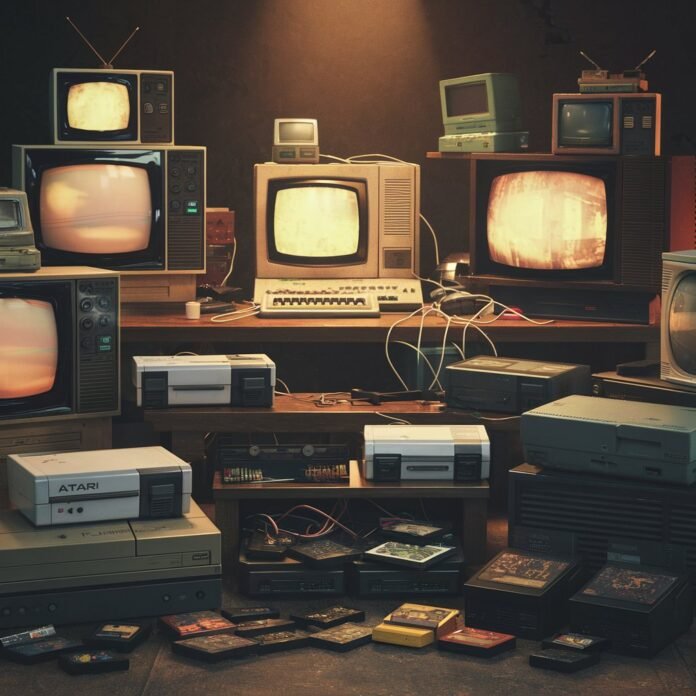TheGameArchives.com stands as the definitive digital repository for video game preservation, offering unparalleled access to gaming’s rich and diverse history. Our platform serves as a living museum, research hub, and community center for gamers, historians, and developers alike, bridging the gap between nostalgic appreciation and academic study of interactive entertainment. With meticulously curated collections spanning from the earliest text adventures to cutting-edge AAA titles,
TheGameArchives.com provides context, commentary, and preservation for every era of gaming. Whether you’re investigating the development of a classic franchise, studying the evolution of game design, or simply rediscovering childhood favorites, our comprehensive database, insightful articles, and vibrant community discussions create the most complete picture of video game history available anywhere online. This article will guide you through the essential features and resources that make TheGameArchives.com an indispensable tool for anyone passionate about gaming culture.
1. Exploring Our Massive Game Database
At the heart of TheGameArchives.com lies our exhaustive game database, containing detailed entries for over 50,000 titles across dozens of platforms and regions. Each game profile represents months of research, combining factual release data with rich contextual information that brings these digital artifacts to life. Our entries go far beyond basic specifications – you’ll find development timelines tracing a game’s conception through to release, analysis of cut content and unused assets, comparisons between regional versions, and documentation of post-release updates and patches.
Particularly noteworthy is our “Version Comparison” feature, which allows side-by-side analysis of different releases, demonstrating how games evolved across regions or platforms. For rare and unreleased titles, we’ve assembled comprehensive “Labs” sections featuring prototype builds, design documents, and developer commentary that provide unprecedented insight into the creative process. The database is fully cross-referenced, enabling users to trace connections between games through shared staff, engines, or design philosophies, creating a living map of gaming history that reveals unexpected relationships and influences.
2. Cutting-Edge Search and Discovery Tools
Navigating our vast collection is made effortless through our sophisticated search system, which offers both precision and serendipitous discovery. The “Advanced Search” function allows filtering by dozens of criteria including hardware specifications, genre conventions, staff credits, and even specific programming languages used in development. Our proprietary “Time Machine” feature lets you explore games through historical lenses – see what was innovative about a 1992 title through the context of its era, or track how particular game mechanics evolved across decades.
For visual learners, the “Interactive Timeline” presents gaming history as a dynamic, zoomable map where you can follow the emergence and cross-pollination of genres and technologies. Perhaps most revolutionary is our “Game DNA” system, which analyzes titles across hundreds of design elements and suggests unexpected connections – discovering, for instance, how modern indie darlings share structural DNA with forgotten arcade classics. These tools are constantly refined by our team of gaming historians and data scientists to provide increasingly sophisticated ways to explore and understand game history.
3. Multimedia Archives and Preservation Initiatives
TheGameArchives.com houses one of the world’s most comprehensive collections of gaming-related media, carefully preserved and contextualized for research and enjoyment. Our digital restoration lab has processed thousands of hours of vintage gaming footage, from commercials and developer interviews to tournament footage and trade show demonstrations, all meticulously cataloged and cross-referenced with relevant game entries.
The “Sound Archives” section offers pristine rips of game soundtracks alongside composer interviews and technical breakdowns of iconic sound chips. For researchers, we provide access to scanned and transcribed documents ranging from internal design bibles to publisher memos that reveal the business decisions shaping our favorite games. Our most ambitious preservation project is the “Code Archaeology” initiative, where we collaborate with original developers to annotate and explain significant source code releases, creating living documents that illuminate the technical artistry behind classic games. These resources are complemented by our “Oral History Project,” which records and preserves firsthand accounts from gaming pioneers, ensuring their stories and insights aren’t lost to time.
4. Community Features and Collaborative Research
TheGameArchives.com thrives through its vibrant community of contributors who help expand and refine our understanding of gaming history. Our “Citizen Archivist” program trains and certifies community members to contribute verified information, with a rigorous peer-review process ensuring accuracy. The platform’s collaborative tools allow users to propose edits, add citations, and engage in scholarly discussions about game history interpretations.
Each month, we host “Deep Dive” community research projects focusing on specific games, genres, or historical periods, pooling collective knowledge to create definitive resources. Our forums have become a gathering place for both enthusiasts and industry veterans, with special “Ask the Developer” threads where creators share behind-the-scenes stories. The “Mysteries” section crowdsources investigations into unanswered questions about game development, from identifying uncredited staff to tracking down rumored cut content. These community-driven features ensure TheGameArchives.com remains dynamic and ever-evolving, with new discoveries and insights added daily by our global network of passionate game historians.
5. Educational Resources and Learning Tools
Recognizing gaming history as a legitimate field of study, TheGameArchives.com offers robust educational resources for students, teachers, and researchers. Our “Learning Pathways” provide structured journeys through specific aspects of game history, complete with curated primary sources, commentary from experts, and suggested research projects. The “Design Evolution” series traces how specific game mechanics developed over time, using interactive examples that let you experience variations firsthand.
For academic users, we provide citation tools and export functions that meet scholarly standards, along with access to peer-reviewed articles from our journal of game studies. Educators can take advantage of ready-made lesson plans that use game history to teach concepts ranging from computer science to cultural studies. Our “Virtual Exhibitions” feature creates museum-like experiences around specific themes, combining artifacts, commentary, and interactive elements to provide deep dives into topics like the golden age of arcades or the rise of JRPGs. These resources make TheGameArchives.com an invaluable tool for formal education while remaining accessible and engaging for casual learners.



